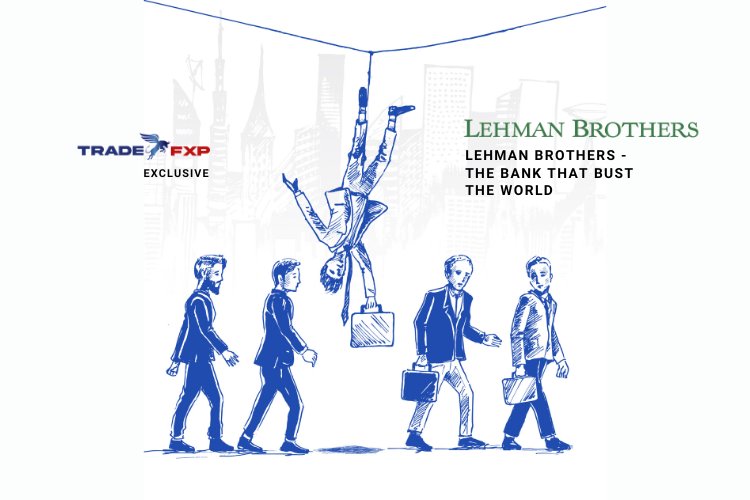Lehman Brothers - The Bank That Bust the World
Explore the story of Lehman Brothers, the bank whose collapse in 2008 sparked the global financial crisis. Gain insights into what led to its downfall.

Lehman Brothers - The Bank That Bust the World
Lehman Brothers in 2008, which caused a global financial crisis and billions of losses, highlights the role of risky expansion, excessive focus on due diligence, high leverage ratio, poor decision-making, failed negotiations, and greed in the downfall of the firm.
The bankruptcy of Lehman Brothers led to a global financial crisis with terrible results. When Lehman Brothers were about to go bankrupt in 2008, the US was in a tough spot. The heads of America's biggest banks were called to a crisis meeting to decide whether to keep it alive or let it go bankrupt, which could have had serious effects on the world economy.
Lehman Brothers were in danger of going bankrupt because it had made a lot of big property investments, lost billions of dollars, and had trouble getting credit and gaining the trust of its shareholders.
During the subprime mortgage crisis and the fall in home prices, Lehman Brothers were in trouble, but the government didn't help them out. Instead, the bank was saved by its competitors. Bank of America and Barclays were both looked at as possible companies to buy. A team led by Bob Diamond was sent to New York to do research and evaluate the opportunity.
Richard Severin Fold Jr. was a key part of Lehman Brothers' success and growth. Lehman Brothers went from being a traditional investment bank to using borrowed money to play the markets. His goal was to beat Merrill Lynch, Morgan Stanley, and Goldman Sachs, which were the company's biggest competitors.
Lehman Brothers went out of business because they took risks by selling more complicated financial products and spent too much time on due diligence with another company, which left them with a huge hole in their balance sheet.
Dick was hard to get to know because he put up a wall around himself, while Ford had over 60 offices and 28,000 employees around the world. During the opening of Lehman Brothers' new European headquarters at Canary Wharf, Dick Fuld, the company's CEO, made a very harsh attack on people who sell short.
Lehman Brothers tried to make more money by selling more complicated products like credit default swaps. This made them take on more risk, which led to their downfall in the end. Modern finance gave people a false sense of security by spreading risk out over a large area. This led to life-changing rewards for traders and profits for businesses.
During due diligence, Lehman Brothers' management spent too much time with another company. This led Bank of America to find a huge hole in Lehman's balance sheet. Merrill Lynch was about to go bankrupt, but Bank of America saved it and bought it for $50 billion. Lehman Brothers, on the other hand, was left out in the cold.
The company was about to go bankrupt and needed help from the US government. When that wasn't possible, Bank of America and Merrill Lynch came up with a plan. Bank thought it was inevitable that Lehman would go bankrupt, so he turned his attention to protecting Merrill Lynch's shareholders, employees, and clients.
The speaker called the CEO of Bank of America and suggested they look into strategic options. This led to a secret meeting and Lehman Brothers being kicked out of the Federal Reserve. After a quick romance and a slip of the tongue at a meeting, Bank of America bought Merrill Lynch for $50 billion.
Lehman Brothers only had one possible buyer, but Barclays seemed more interested in the deal. This left CEO Dick Fuld with nothing to do but watch.
The high leverage ratio of 44-1 at Lehman Brothers led to huge losses in 2007 and, in the end, to bankruptcy. The subprime mortgage scandal was made worse by the fact that loans with tempting introductory rates were given to clients who were taking on more and more risk. This caused the prices of American homes to go up, and Wall Street banks made most of their money by trading bundles of these loans with each other and other institutional investors.
Investment banks thought they had eliminated risk, which led Lehman Brothers to borrow more and more money. By August 2007, the bank was borrowing up to 44 dollars for every dollar it owned. Lehman Brothers' high leverage ratio of 44-1 caused them to lose a lot of money when the real estate market crashed in 2007.
Lima Brothers gave a developer $78 million to build a luxury spot in Bakersfield, but the project failed because of the subprime crisis and Lehman Brothers' bankruptcy. Lehman Brothers put a lot of money into the real estate market, which led to unpaid work and a big weight on their balance sheet. Eventually, this caused them to go bankrupt.
Negotiations went on all night, and it looked like a deal was close to being reached, but nobody knew for sure if Lehman's was too big to fail.
Lehman Brothers went out of business because of pressure from the media, bad decisions, and failed talks with Barclays. The media took videos of the Fed without knowing who they were looking for. They took pictures of anyone in a suit in hopes of figuring out later who they were.
As the bank's stock fell and its relationship with the media got worse, the CEOs of Lehman Brothers covered their faces. This may have been out of shame. The media did not cause a run on the bank because institutions chose to use leverage on their balance sheets. However, the constant coverage of Lehman's falling share price created a downward spiral that made it necessary to stop the rumour mill.
Lehman Brothers and Barclays couldn't agree to a deal that required guarantees for Lehman's debts. Without a guarantee from Treasury Secretary Hank Paulson, Lehman would have been kicked out of business. The British government didn't want Barclays to go through with the deal, and the FSA didn't stop it because Barclays never gave them a deal they liked.
The sudden bankruptcy of Lehman Brothers caused chaos in the market and led to a very bad recession. Without giving them a reason, Lehman Brothers were told to get ready for bankruptcy by midnight. This caused panic and uncertainty in the market. Lawyers and accountants were focused on getting the filing ready, while business managers and traders were shocked and couldn't think about the consequences right away.
The 158-year-future old's is unclear, and the situation seems bad, with a depression looming and the speaker having no other choices. In a last-ditch effort to stop the bank from failing, Lehman Brothers executives tried to get in touch with President Bush through his second cousin, but they were not successful.
The bankruptcy of Lehman Brothers was a turning point that showed how many bad assets there were in the banking system and how complicated the relationships between institutions were. It caused panic and put 5,000 people out of work. When Lehman Brothers went bankrupt, it caused a financial crisis that shut down the credit markets and led to a very bad recession. When Lehman Brothers went bankrupt, it set off a global financial crisis and cost billions of dollars.
The collapse of Lehman Brothers made it hard for people to talk to each other and caused stock markets around the world to fall by $700 billion. Money markets also stopped working because people lost faith in them. When Lehman Brothers went bankrupt, people lost faith in the global financial system and panicked. Some people argue that the US government should have saved the bank, but letting it fail was a huge mistake that cost billions of dollars and shut down credit markets.
The US didn't have enough tools to protect the economy before the financial crisis, and the fact that Lehman Brothers should not have gone bankrupt shows how important it is to change regulations all at once. Lehman Brothers did not honour the speaker's severance agreement after 20 years of service, so they got nothing.
Lehman Brothers failed because of greed and overvaluing assets, which led to short-term financing for investments that were meant to last for a long time. Dick Fold showed up at a congressional hearing, but he didn't say sorry or admit anything about what happened.
Lehman Brothers went bankrupt because of greed and arrogance. The bank lied about and overvalued its assets, which led to short-term money being used to fund long-term investments.
To read more interesting articles CLICK HERE
Why do you need to be with TradeFxP? CLICK HERE
To join our Hunter AutoBot Trading Program CLICK HERE
All About TradeFxP's Hunter Ai EA Autobot CLICK HERE



 admin
admin 










